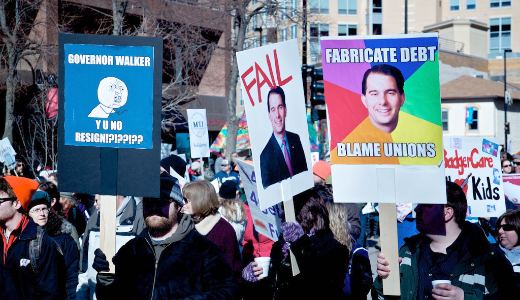
MADISON – With so many new polls showing Wisconsin Republicans in trouble after their attack on collective bargaining rights, some have joked that Republican Gov. Scott Walker may soon introduce a bill banning voter surveys altogether.
Then he wouldn’t have to look at poll results like those released yesterday, showing a massive defection of independents from Walker, who won majority support from them in the last election. His disapproval rate among Wisconsin independents has jumped to 59 percent, according to a survey released yesterday by the polling firm Greenberg, Quinlan and Rosner.
Adding to right-wing angst are complaints by conservative activists that the Wisconsin Republican Party is not putting resources into the recall campaigns against the Democratic senators who fled the state. That lack of support has forced conservatives to scale back their recalls against eight Democrats to just three. The scaling back of the right-wing recall effort comes as the efforts by labor and the Democrats pick up steam. After only two weeks the Democrats have more than half the signatures they need already in hand.
The right-wing recall effort never had the same kind of grass roots backing as behind labor’s recall campaign against Republican senators. The conservative recall was actually started by outside groups from Utah that had to find local backers to sign on in Wisconsin.
Progressives here are also continuing bold action in the courts.
A new lawsuit was filed yesterday to overturn the anti-union law rammed through last week by Republican senators.
The suit by Ismael Ozanne, the Dane County district attorney, is the second from a county official since Walker signed the law banning collective bargaining.
Like the earlier lawsuit, court papers filed with this one say Republican lawmakers violated Wisconsin’s open meetings laws when they amended the budget proposal to turn it simply into a bill that killed collective bargaining rights.
Right wing woes are on the rise in places other than Wisconsin, too.
Ohio’s Gov. John Kasich is widely perceived as having flopped in his town hall effort to sell his draconian budget cuts.
He received only slight and scattered applause from the 900 in attendance with teachers, public workers and their supporters getting loud and vocal support when they spoke out against his cuts.
Hope Rummel, a cop from Alliance, Ohio, said she voted for John McCain in 2008 but is “alarmed by what Republicans are doing now. Nobody gets rich being a police officer or being a fireman.”
A new Washington Post/ABC News Poll, out just after the town hall, had no good news for either Kasich or Walker.
Fewer than four in 10 surveyed said they could support cuts in spending for roads and infrastructure or layoffs of state employees.
Only two in 10 would support cuts in Medicaid, cuts to parks and recreation areas or cuts to public schools.
To top everything off, the Center on Budget and Policy Priorities issued a report yesterday that found cuts in programs that help the working poor are counter-productive when it comes to closing budget gaps.
The Center’s report singled out Wisconsin Gov. Scott Walker’s proposal to raise taxes on working families by cutting the state’s Earned Income Tax Credit even as he proposes reducing corporate taxes. The EITC cut would mean more than double the tax bill for a single working parent with two kids and earnings of $25,000 from $193 to $394.
The CBPP questions why Walker would attack a program conservatives have long refrained from opposing. EITC, they note, helps the working poor by creating incentives for remaining on the job.
Image: antrover // CC BY-NC-SA 2.0












Comments